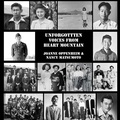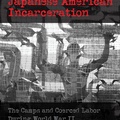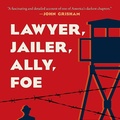Read part 2 >>
Even before Japan’s December 7, 1941, bombing of the U.S.’ Hawaiian naval station at Pearl Harbor, then home to the main part of the American fleet, precipitated the Masuda family’s eventual exclusion from designated West Coast military areas, along with the rest of the approximately 2000 other Orange Countians of Japanese descent, some of the county’s Nisei were required to exchange their agricultural attire for military apparel.
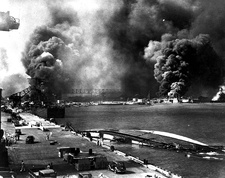
Pearl Harbor Attack, December 7, 1941 (Photo courtesy of Masao Masuda and Susan Shoho Uyehara, Japanese American Living Legacy/Nikkei Writers Guild)
This occurred because of the passage by Congress of the Selective Training and Service Act of 1940 on September 17, 1940, which President Franklin D. Roosevelt signed into law two days later. This act, which was the first peacetime conscription in United States history, required men between ages 21 and 35 to register with their local draft boards.
Ironically, a little over a year later, on October 17, 1941, both Kaz Masuda and his younger brother Tak received their draft notice to serve in the U.S. Army.
As a result, these two Masuda brothers were involved in basic training for the army, Kaz at Fort Ord, California, and Tak at Camp Roberts, California on the so-called “Day of Infamy,” the name President Roosevelt used to denote Japan’s surprise December 7, 1941, attack on Pearl Harbor.
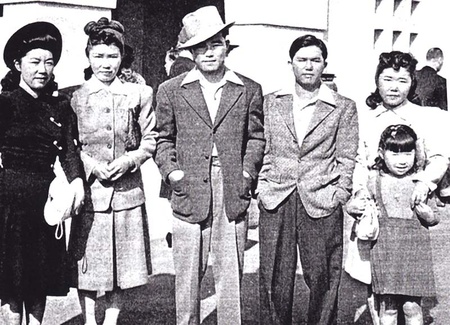
Takashi and Kazuo Boarding the Train for Respective Basic Training Camps at Camp Roberts and Fort Ord, Flanked by Masuda Family Members (Photo courtesy of Masao Masuda and Susan Shoho Uyehara, Japanese American Living Legacy/Nikkei Writers Guild)
In the excellent 2009 book narrated by Masao Masuda and written by Russell K. Shoho, From the Battlefields to the Home Front: The Kazuo Masuda Legacy, the collaborative authors provide the following account of the immediate impact of Pearl Harbor on the Issei leaders of the Orange County Japanese American community like Gensuke Masuda.
That very night, only hours after the Pearl Harbor attack, two sheriffs came to the Masuda’s residence on Newhope Road, and asked if there was a Gensuke Masuda living there. June Masuda Goto was 19 then and remembers holding open the screen door for the deputies. They said they came for Gensuke Masuda. Tamae Masuda cried. Gensuke was home and they told him they were ordered to pick him up. It was so sudden, recalled Masao Masuda. They loaded my dad and other parents who were Isseis onto a bus. We asked where they were taking them but were given no reply. The Masuda family was devastated, not knowing what their father had done to deserve such humiliating treatment.
He was among 18 [Orange County] Japanese men interrogated by FBI agents that night at the County Jail in Santa Ana. Ten days later, Gensuke Masuda was accused of “subversive activity” and sent to a stockade at Ft. Missoula [Internment Camp], Montana [administered by the U.S. Department of Justice]. There was no trial, no opportunity to answer the accusations.
Incensed by the arrest of his father, Kaz wrote a letter of protest to the proper American government authorities in Washington D.C., in which he expressed the following message:
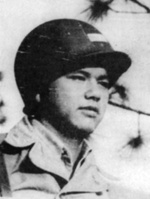
Kazuo Masuda in Military Battle Outfit (Photo courtesy of Masao Masuda and Susan Shoho Uyehara, Japanese American Living Legacy/Nikkei Writers Guild)
I cannot believe that my father has done any act of disloyalty towards the United States. He has been a resident of this country for over 40 years; that is to say, since 1898. He has been a farmer for over 35 years. During this time he has seen his sons and daughters grow into good, solid American citizens. Only recently has he given up the leadership of his family in favor of my older brother, Mitsuo, because of old age and ill health caused by stomach ulcers. I know my father, though an alien is loyal to this country in which he has lived the greater part of his life. If he had been given the privilege of naturalization, I know that he would not have failed to secure the citizenship of the United States for himself. He has, in my opinion, maintained during his 44 years of residence in this country a perfect record of unquestioned loyalty. He has never been arrested for any violations of the laws of this country. That he would commit acts which endanger the safety of this country is unthinkable. At the moment of this writing, he has two sons in the armed services of this country; my brother, Takashi, and me. He has two other sons, Mitsuo and Masao, who are also eligible for the services.
In all the 23 years I have lived with my father, he has never uttered a single word against the United States. He has always considered this nation his country, and I believe he has done his part in making it the great nation that we are. He did not, as so many others have done, send any of his children to Japan for any part of their education. He wanted his children to be Americans. I know that he has succeeded in his wish. He has often expressed hope that he would be able to spend the remainder of his life in the United States. I believe that his arrest and his subsequent imprisonment and internment were based on mistaken facts. I would be grateful if his release could be affected in the near future.
The facts behind the government’s arrest of Gensuke Masuda were sent to the Masuda family subsequent to Kaz’s letter of protestation. What inspired his arrest, said the federal authorities, was that Gensuke had been actively involved with the local Orange County Japanese wrestling or sumo team, which frequently held wrestling matches with sailors on leave from touring Japanese vessels. Moreover, the local club that sponsored the wrestling team had hosted these sailors to a chop suey dinner, and it was this situation that served as the basis for the charge of “subversive activity” against Gensuke. It was similar innocuous activities on the part of some 2,000 West Coast Japanese alien residents in and outside of Orange County that had prompted the government in the wake of Pearl Harbor to be suspicious that Issei were possible saboteurs and spies for Japan and thus deserving of detention in alien enemy internment centers such as the one at Missoula.
* This was a presentation at a public program in support of New Birth of Freedom: Civil War to Civil Rights in California at the Orange County Agricultural and Nikkei Heritage Museum, Fullerton Arboretum, California State University, Fullerton on October 19, 2011
© 2011 Arthur A. Hansen


